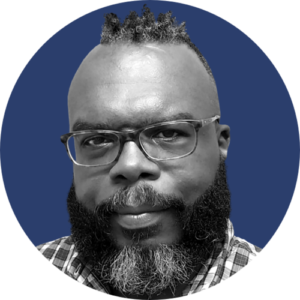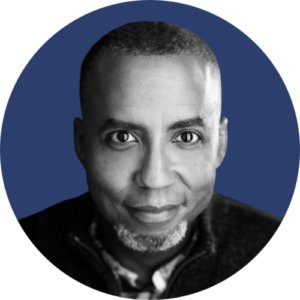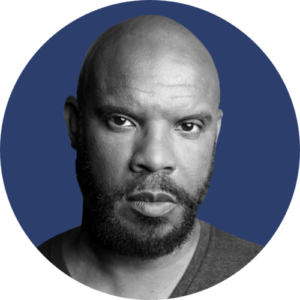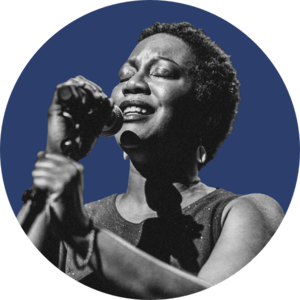As Black Americans ventured into the new lives made available to them by their hard-earned freedom, they continued to face relentless opposition—overtly from ex-Confederates, and more subtly from indifferent whites who viewed the end of enslavement as the end of the struggle for equality.
Even as African Americans gained the right to vote and began to exercise their new rights in political life, they were already faced with the prospect of losing that right or even their lives. Their recognition that emancipation was the beginning of a long haul towards civil, political and social rights was essential in safeguarding the futures of millions of Americans.
View Transcript
Kidada Williams: Previously on Seizing Freedom:
Sarah Nash: Let them break me up, put me in jail, or do what they please with me, I say I am done serving them, by the help of God and the U.S. Army.
Nationalist: The sword may make the freedman, but only the truth makes the free man.
Milwaukee Daily Sentinel: Guns were fired at Lawrence, Kansas in honor of the passage of the Civil Rights Bill over the President’s veto.
Anna J. Cooper: Now the fundamental agency under God in the starting point of our progress upward, must be the Black woman. No other hand can move the lever. She must be loosed from her bands and set to work.
KW: In 1866, abolitionist, poet, and orator Francis Ellen Watkins Harper prepared to take the stage at the Eleventh National Women’s Rights Convention.
Letter to the Christian Recorder: We have heard Frederick Douglass, and hesitate not to say that for beauty of expression, richness of illustrations, and, in a word, rhetorical finish, she is his superior. He is more massive than Mrs. Harper, but she is more polished than he, and fully his equal in warm and glowing eloquence.
KW: As she ascended to the platform, Harper would have looked out onto a sea of white women — assembled by powerhouses like Susan B. Anthony, who was also in attendance. Harper was likely one of a few Black women there — and definitely the only Black woman permitted to speak. She started by establishing their common ground.
Francis Ellen Watkins Harper: We are all bound up together in one great bundle of humanity…
KW: Harper told the story of how, when her husband died just two years earlier, landlords swept in and claimed all of her property — including the equipment she used to make and sell butter to earn a living. She was a widow, alone with four children — a plight her audience could relate to.
FEWH: Had I died instead of my husband, how different would have been the result! By this time he would have had another wife, it is likely; and no administrator would have gone into his house, broken up his home, and sold his bed, and taken away his means of support.
KW: Harper was invited to speak about women’s right to vote. But that’s where her common purpose with the audience started to break down.
FEWH: Born of a race whose inheritance has been outrage and wrong, most of my life had been spent in battling against those wrongs. But I did not feel as keenly as others, that I had these rights in common with other women, which are now demanded.
KW: Before she could fully support universal suffrage, Harper wanted the women in her audience to fundamentally change their ideology.
FEWH: I do not believe that giving the woman the ballot is immediately going to cure all the ills of life. I do not believe that white women are dew-drops just exhaled from the skies. I think that, like men, they may be divided into three classes: the good, the bad, and the indifferent.
KW: Harper’s concern was that most white women across the country would claim an equal rights victory once they got the right to vote — and then turn around, and betray that pledge to equality, by voting in league with their conservative white husbands.
FEWH: I have sometimes said I thought the nation has touched bottom. But let me tell you there is a depth of infamy lower than this. It is when you, standing upon the threshold of a great peril, reach out your hands to my race, and ask that we aid you, and when the peril is over, say we are good enough for soldiers, but not for citizens.
We have a woman in our country who has received the name of “Moses,” not by lying about it, but by acting out—a woman who has gone down into the Egypt of slavery and brought out hundreds of our people into liberty.
KW: In addition to her work on the Underground Railroad, that woman — Harriett Tubman — had been a scout and spy for the Union Army. In 1865, she was forcibly ejected from a half-price seat on a passenger train in New Jersey. It took four white conductors to move her. They broke her arm in the process, and threw her in the baggage car.
FEWH: That woman, whose courage and bravery won a recognition from our army and from every Black man in the land, is excluded from every thoroughfare of travel. You white women speak here of rights. I speak of wrongs.
KW: Not until white women pledged to vote with conviction and principle, Harper said, would they deserve the power and responsibility of voting in order to change the course of the nation.
FEWH: You talk of giving women the ballot-box? Go on. Society cannot trample on the one of us without receiving the curse in its own soul. You tried that in the case of my people. But this country cannot afford to neglect the enlightenment of any class of its members.
KW: I’m Dr. Kidada Williams. This is Seizing Freedom. Today on the show, the power of the ballot. We’re going to see how Black Americans mobilized to confirm their civil and social rights by hard-wiring them into federal policies. How technicalities in the letter of the law enabled Southern legislatures to undermine those efforts. And how the long haul of seizing Black American freedom meant planning for the future, even as the present structures crumbled.
Although many Black men within the former Confederacy were acquiring the right to vote at home, in the 1860s their political rights in other states remained in limbo. Frederick Douglass cast his appeal for nationwide suffrage in terms of justice. He argued it was unjust to give political power back to ex-Confederates and none to loyal Black people.
Frederick Douglass: To make peace with our enemies is all well enough; but to clothe our enemies, who sought the destruction of the government, with all political power, and leave our friends powerless in their hands, is an act which need not be characterized here.
KW: He also hoped that Black people having a voice in politics would offer practical protection from the worst of white abuse.
FD: It is a measure of relief, a shield to break the force of a blow already descending with violence, and render it harmless.
KW: During a speech at the American Equal Rights Association Convention in 1869, after describing violent scenes of arson, kidnapping and lynching, Douglass declared that not until women knew such pain would they feel the urgency of enfranchisement.
When someone from the audience asked, “Uh…Is…that not all true of the Black woman?” Douglass answered:
FD: Yes, yes, yes; it is true of the Black woman, but not because she is a woman, but because she is Black.
KW: Besides denying the intersections of their identities, this assertion presumed that Black women were on the outside of Black social and political life. In reality, they were essential players in Black democratic spaces.
Anna Julia Cooper — a teacher, writer, and activist — gave civil rights lectures across the country with special attention to raising the public status of other Black women.
Anna Julia Cooper: Is not woman’s cause broader, and deeper, and grander than a blue stocking debate or an aristocratic pink tea? It is woman’s mission to plead with her country to cease to do evil and to pay its honest debts.
KW: Born into bondage, Anna immediately pursued a formal education after the Civil War, graduating from Oberlin College with a masters in math. In her intellectual circles, Black women voted at conventions, and formed their own political and relief organizations — where they also controlled policy and purse strings.
So when some Black women did seek the right to vote during Reconstruction, they weren’t trying to gain new rights, but to hang on to rights they already knew how to exercise.
AJC: Let her rest her plea on the obligation of legislators to do for her as they would have others do for them were relations reversed. Let her try to teach her country that when race, color, sex, and condition are realized to be the accidents, not the substance of life, and consequently as not obscuring or modifying the inalienable title to life, liberty, and pursuit of happiness…then woman’s lesson is taught and woman’s cause is won. God hasten the day.
KW: That day would have to wait. When the Fifteenth Amendment was ratified in 1870, it removed all restrictions to voting and serving in office “on account of race, color, or previous condition of servitude.” But it made no mention of gender.
Though not all Black women were bothered by this. Many understood the gender politics of suffrage, and were quite comfortable with the power they already exerted in domestic life, at work, in schools and in churches.
Even though only Black men had been granted the vote, Black women found ways to exercise it. In an essay called, “Woman’s Power,” Alice King wrote:
Alice King: The issue of women’s suffrage has made many women’s pens and tongues red hot. But it seems to us very likely that woman, if she reaches her object will lose much more than she will gain. Women’s power is most effective when exerted through indirectness, when they speak a word or two, which appeared to be dropped carelessly.
KW: This tactic, King wrote, was an influence more powerful than what she called “so comparatively small a privilege as the suffrage.”
AK: This is a warning against woman lowering her dignity, crying out so widely for a thing which, after all, cool, common sense seems to point out to be more man’s business.
KW: In Danville, Virginia, Violet Keeling exercised her influence by escorting her husband to the polls and making sure he carried out his “man’s business.” She also threatened to impose sanctions against men who voted conservatively.
Violet Keeling: As for my part, if I hear of a colored man voting the Democratic ticket, I stay as far from him as I can; I don’t have nothing in the world to do with him. I don’t allow him to come in my house. If my husband voted the Democratic ticket, I would just pick up my clothes and go to my father’s, if I had a father, or would go to work for 25 cents a day.
KW: In 1872, Francis Harper published a volume of poems called “Sketches of Southern Life,” based on her own observations:
FEWH: Day after day did Milly Green / Just follow after Joe / And told him if he voted wrong / To take his rags and go. / I think that Colonel Johnson said / His side had won the day, / Had not we women radicals / Just got right in the way.
KW: Whether or not they cast ballots, African Americans celebrated the franchise as sacred. As Anna Cooper wrote, being a member of the post-emancipation generation — with its revolutionary spirit and new possibilities — was “to have a heritage unique in the ages.”
AJC: Everything is new and strange and inspiring. There is a quickening of the pulse, and a glowing of its self- consciousness. Aha, I can rival that! I can aspire to that! I can honor my name and vindicate my race! Something like this is the enthusiasm which stirs the genius of young Africa in America and the memory of past oppression and the fact of present attempted repression only serve to gather momentum for its irrepressible powers.
KW: In 1870, Black men across the country not only voted, but held office and shaped policy directly. African Americans sent upwards of 600 lawmakers to state legislatures and 16 to the U.S. Capitol.
Henry O. Wagoner, Jr. was invited to mark the passage of the Fifteenth with a speech when he was just 20 years old. Though he spoke to a local audience in Denver, Colorado, he addressed his words to the President and his fellow citizens — and reminded African Americans of their responsibilities.
Henry O. Wagoner, Jr.: The consummation which we celebrate is of great practical importance. It adds, instantaneously, nearly a quarter of a million voters…This act is the completion of one of the greatest reforms ever accomplished by any nation. The revolution has been vast, rapid, grand. The despised chattel of 1860 is the respected voter of today.
But while we dwell upon the struggles of the past and the triumphs of today, let us not forget the duties of tomorrow. Long indulged prejudice can not be legislated away, and in the exercise of our new privilege we will be jealously watched.
KW: He was right. At the national level, lawmakers still had to defend against jealous ex-Confederates who were trying to take political power back. For the moment, they were held at bay by the “test-oath,” which they had to swear to, before running for office or voting.
Ex-Confederate: I do solemnly swear (or affirm) that I have never voluntarily borne arms against the United States since I have been a citizen thereof; that I have voluntarily given no aid, countenance, counsel, or encouragement to persons engaged in armed hostility thereto…
KW: Jefferson F. Long — a Black Congressional representative from Georgia — gave only one speech during his three-month term in 1871, before he was barred from reelection by white conservatives. He used his chance to speak out against a potential repeal of the test-oath requirement.
Long knew that without the oath, legislators and voters–who were also members of the Klan–would have open access to the ballot box and government offices to roll back African Americans’ gains.
Jefferson Long: If this House removes the disabilities of disloyal men by modifying the test-oath, I venture to prophesy you will again have trouble from the very same men who gave you trouble before.
Do we, then, really propose here today, when the country is not ready for it, when those disloyal people still hate this Government…to relieve from political disability the very men who have committed these Ku Klux outrages?
KW: The answer was yes. Congress didn’t remove the test-oath, but it changed the language from a declaration of past loyalty to a promise of future loyalty. Southern white conservatives were more than willing to violate the spirit of the new law with election fraud, poll taxes, literacy tests, and violence to deny Black men their votes.
JL: In my State since emancipation there have been over five hundred loyal men shot down by the disloyal men there, and not one of those who took part in committing those outrages has ever been brought to justice. When we take the men who commit these outrages before judges and juries we find that they are in the hands of the very Ku Klux themselves who protect them.
KW: In Mississippi, white conservatives took a new oath for themselves: “Carry the election peaceably if we can; forcefully if we must.”
In South Carolina they declared, “Every Democrat must feel honor bound to control the vote of at least one Negro, by intimidation, keeping him away. If he deserves to be threatened, the necessities of the time require that he should die.”
The first Civil Rights Bill, the 14th and 15th Amendments…all were grand achievements, but none was enough to secure Black people’s equal right to be safe in America.
It was clear by 1875 that Constitutional Amendments did not address the oppression and physical violence African Americans still faced in daily, public life. Along with formal citizenship and enfranchisement, Black people deserved to be able to attend to their personal and professional business — to go to school, to travel on trains and streetcars, and even enjoy some of the aspects of a good life by visiting public parks, residing at an inn, eating in a restaurant, attending the theatre…
New Orleans Tribune: Mr. V. E. Macarty, a respectable gentleman of polished manner, was put out of the opera house on Tuesday evening because he is a colored man.
KW: …and do it without assaults on their dignity or physical bodies, by white people denying them access or services they paid for.
New Orleans Tribune: Indeed we intend never to rest till our political and civil rights are fully secured to us. This we say in no spirit of bravado. We simply want what belongs to us, and we want it now.
KW: But the same restrictions and violence that allowed white men to brutally eject Harriett Tubman from a train a decade earlier persisted. Francis Harper had her own version of the same story:
FEWH: Going from Washington to Baltimore this Spring, they put me in the smoking car. Aye, in the capital of the nation, where the Black man consecrated himself to the nation’s defence, faithful when the white man was faithless, they put me in the smoking car!
They did it once; but the next time they tried it, they failed; for I would not go in. I took my seat in a car, and the conductor came to me and told me to take another seat. I just screamed “MURDER!!” The man said if I was Black I ought to behave myself. I knew that if he was white, he was not behaving himself.
Are there not wrongs to be righted? I felt the fight in me; but I don’t want to have to fight all the time.
KW: That effort of constantly having to square up against violent prejudice took its toll, even on titans like Harper and Tubman. Black people were — and are — made to bear the weight of those infringements at every level. Violence comes in many forms, sometimes it sifts in–light as dust–and, like dust, it accumulates.
Black people advocating equal rights weren’t interested in so-called social equality for the purposes of being in the physical company of white people. In fact they were perplexed, and insulted, that white people thought that their mere presence was magically advantageous to Black people rather than unceasingly violent, and that somehow all Black people were clamoring for it.
Joseph Rainey: I can say for myself that I am contented to be what I am so long as I have my rights.
KW: Congressman Joseph Rainey didn’t want to be white or marry white people or ask anything of whites.
JR: Because I believe that the race of people I represent, to the extent of the opportunities which they have had, and considering how recently they have escaped from oppression and wrongs committed upon them, are just as virtuous and hold just as many high characteristics as any class in the country…
KW: But he also knew the social, political and physical danger of the white conservative lie of social equality. Rainey and African Americans wanted equality so they and all people could enjoy the same liberties in public life as white people often took for granted. Equality might also help them begin to transcend centuries of enslavement and oppression, and fulfill their dreams of liberation.
JR: We do not ask the passage of any law forcing us upon anybody who does not want to receive us. But we do want a law enacted that we may be recognized like other men in the country. Why is it that the colored members of Congress cannot enjoy the same immunities that are accorded to white members? Why cannot we stop at hotels here without meeting objection? Why cannot we go into restaurants without being insulted? I say to you gentlemen…public opinion is aroused on this question. I tell you that the Negro will never rest until he gets his rights.
KW: While states under liberal Republican control passed measures barring racial discrimination in public places, African American activists wanted to see a federal ban.
As they did with the first Civil Rights Act in 1866, Black Congressmen in the 1870s worked with white allies to propose a supplemental bill. This one would grant all citizens–regardless of race–access to public accommodations. A mass meeting in Macon, Georgia, where nearly 4,000 are said to have attended, resulted in a resolution sent to Congress:
Macon Resolution: We earnestly beg and pray that you pass the Supplemental Civil Rights Bill…We can never be complete American citizens until such a law is enacted. Our wives, daughters, ministers, and legislators are the subjects of daily insults and outrage for the want of legal protection on the public highways and other public corporations and institutions and will be so long as we are denied the full rights of citizenship.
KW: Enacted on March 1, 1875, the latest Civil Rights Act affirmed the “equality of all men before the law” and prohibited racial discrimination in public places like restaurants, theaters, trains and streetcars. Sections allowing all citizens equal access to schools, churches, and cemeteries were removed before it passed.
The law of the land sanctioned changes in politics — but also in society and culture — and some whites were stung by the shifts. They wanted their power and privilege back, and a return to social deference. Conservatives set to work attacking liberals’ bills and amendments, and passing local Jim Crow laws to enforce segregated spaces.
By the fall of 1883, the Supreme Court ruled that Congress didn’t actually have the power to prevent private entities from engaging in discriminatory behavior. They said, the 1875 Act was unconstitutional; Congress, with its Reconstruction plan, had overstepped its powers. Lawmakers, like Reverend Henry McNeal Turner, were incensed.
Henry McNeal Turner: That decision alone authorized and now sustains all the unjust discriminations, proscriptions and robberies perpetrated by public carriers upon millions of the nation’s most loyal defenders. It fathers all the “Jim-Crow cars” into which colored people are huddled and compelled to pay as much as the whites, who are given the finest accommodations.
It has made the ballot of the black man a parody, his citizenship a nullity and his freedom a burlesque. It has engendered the bitterest feeling between the whites and blacks, and resulted in the deaths of thousands, who would have been living and enjoying life today. And as long as the accompanying decision remains the verdict of the nation, it can never be accepted as a civil, much less a Christian, country.
KW: That same month, perhaps emboldened by the Supreme Court’s decision, a group of white business owners in Danville, Virginia signed and circulated a broadside. It was called the “Danville Circular,” and it outlined the “injustice and humiliation to which our white people have been subjected, and are daily undergoing by the domination and misrule of the negro and radical party.”
On November 2nd—the Friday before Election Day—the Readjuster Party held a meeting in Danville to respond. They were an interracial, left-wing coalition party, dedicated to breaking the power of wealth and privilege of the planter class.
William E. Sims, the progressive white chairman of the local Readjusters, publicly denounced the “Danville Circular” to a large, open-air crowd of mostly African Americans. He commented as he read, — “Another lie!” he would say, at the end of each sentence. After Sims had finished, he declared everyone who signed it to be “liars, scoundrels and cowards!” and was met with thunderous applause.
The next day, November 3rd, a 29 year-old Black man named Hense Lawson was walking down Danville’s Main Street…
Hense Lawson: I had controversy with Charles Noel on the 3rd day of November 1883. It was in the morning. I…met Noel coming down Main street, in Danville with my friend Davis Lewellyn. I stepped to one side to get out of the way of some white ladies — there were three of them coming out of a store — and him and me run together, and…I told him “Excuse me,” and he said “What the hell do you mean, you damned black n**,” or something like that. “What do you mean by running up against me?”
I went on…on about 50 yards, I guess…and Noel hit Davis, and Davis knocked him out in the gutter twice. Then Davis joined me and me and him went to the town.
KW: Noel walked to the Opera House, where local white conservatives had been meeting since that morning, preparing a written response to the attack the night before on the Danville Circular. At the Opera House, Noel recruited two friends to help him take revenge on Lawson and Davis.
HL: We saw Noel later going down the street in Mr. Holland’s buggy — and I told Davis to watch out, that fellow is going to tackle you…and then this fellow got down from the buggy in front of the opera house, run up and hit me two times with a pair of brass or iron knuckles. He didn’t say a word; he just hauled off and struck me.
There were several other white gentlemen there — I do not know how many there was. A feller named George A. Lea cocked his pistol in my face and says, “Stand back; I will shoot the last one of your damned heads off.” Noel then struck me three times. I caught him by the neck and I hit him once, and at that time all the whites run up with pistols in their hands.
KW: As a crowd began to form around the combatants, Noel’s white friends drew concealed pistols and told the crowd to stand back. At this point, a nearby Black police officer was summoned to separate the combatants.
HL: We were separated and I got out of the way. I went up to a friend of mine’s and stayed at the house that night.
KW: About a hundred African American men, women and children had gathered around since the fight broke out. Ignoring orders to disperse, they demanded that Lea be arrested for carrying a concealed weapon.
Then, two things then happened at once. Walter Holland, a white Democrat, stepped off the sidewalk. At the sign of movement, several of the white men, including Lea, raised their pistols and fired.
HL: I heard the firing — my friend’s house was out from it about 20 yards, I guess. I was afraid to go down.
KW: When the smoke cleared, Holland and three Black men—Terry Smith, Edward Davis, and another whose name is unknown—lay dead. A fourth Black man died later of his wounds. In the days leading up to the election, the town’s white citizens organized armed patrols to keep the streets clear of African Americans.
HL: I stayed in Danville about a week after that. My left eye was closed about two days. I didn’t go out in the streets. I was in my room all the time. They gave me good advice not to go out.
KW: On November 9th, few African Americans voted in Danville. Conservatives won a large majority of the state General Assembly at that election. Several African American city officials resigned their positions. As Violet Keeling later testified to Congress, Black officials and voters alike feared for their lives.
Violet Keeling: It seemed they were all afraid to go to the polls as bad as they wanted to vote, which I believe every colored one there was a Republican and wanted to vote. I know whether my husband voted. He didn’t vote. I didn’t want to trust him at the ballot-box, because life was better to him than the ballot-box, and I thought it was best for him to stay at home and save his life. My husband didn’t even have a pocket-knife.
I had a little pen-knife and I thought it was best to take that even going to my work. But I stayed at home on election day. He said that if it continued like it was he didn’t think he would ever go and vote any more.
KW: In 1884, Keeling, Lawson, and other Black Danvillians traveled to Washington to testify in front of a Senate committee. One of the testifiers, George Adams, found George Lea waiting for him at the train station. Lea threatened, “You better know but damn little when you get down there.”
The Senate committee found Danville’s white population guilty of stoking violence — but the verdict had no consequences. And when Adams returned home from Washington, Lea attacked him outright — trying to crush his skull with a rock.
Despite the threats and violence, Violet Keeling and George Adams remained in Danville. Hense Lawson left town a week after the original massacre.
HL: I went to Boston. I thought my life was in danger and it was best for me to leave — all colored men are in danger there. I left and I don’t expect to go back.
KW: Lawson sought refuge in the North — he had family there and could potentially rely on them for support as he regained his footing. But as Jim Crow law and Klan violence picked up their pace, more and more Black families sought a different place apart.
Like those who would testify about the Danville massacre, Henry Adams was subpoenaed in 1878 to testify against violent whites in election cases. He was exiled in New Orleans after his testimony, unable to return home with any certainty of safety.
Henry Adams: We poor men, summoned from our homes as witnesses against these murderers, dare not return home to our families, for to do so would be but to be murdered there and by the very men against whom we were summoned to testify before the U.S. Court.
And now that the trials of these men are going on, we the witnesses are threatened with death should we dare return home and only because we have told the truth…
Nevertheless the stars and stripes that emblem ever honored by the brave and true …seems to us a hollow mockery, yet as an emblem of freedom where it waves…
KW: Adams was also part of a growing movement of activists eyeing emigration out of the South. To skirt the mockery of freedom that came with living under Jim Crow, some Black community leaders were looking for new kinds of nationalisms. Adams found his in a back-to-Africa movement.
HA: All we want is men who believe they have something in the world to do and can do something — men who believe that they ought to make a nation; men who believe that they are not the white man’s inferior.
KW: To drum up support, Adams published a letter by a man who had emigrated to Liberia from the American South.
HA: Come to Liberia…We are a free people here, make our own laws…You come to this country, and should you be elected to an office, you will get it. Let me ask you how many Black men you have in the United States Senate now? And how many Black men have you in the House of Representatives?
KW: Meanwhile, in callbacks to Black Codes that dominated the pre- and immediate post-War era, some Louisiana parishes started again to require Black people to have passes while on public roads. Or acquire “protection papers” — which were a signed pledge to vote for white conservatives and would keep you nominally safe from their mercenaries.
Adams saw Liberia as a haven where African Americans could realize the potential of their citizenship, which had been so long oppressed by racism in the U.S. Neither for missionary reasons, nor philanthropy, he championed emigration and petitioned the federal government to pay for it. President Rutherford B. Hayes refused.
HA: So, we know that we all could not get to Liberia without a mighty Hand of God within two years — before the inauguration of a potentially Conservative president. Our Council thought it best to advise our people to leave the South and get somewhere we could be able to leave for Liberia in the time to come.
KW: It’s unclear if Henry Adams managed to get away. But the command of the council was taken seriously. Over the next thirty years, by circulating petitions and using grassroots fundraising tactics, 11,000 Southern African Americans settled in Liberia.
Some did as Adams advised, and left the South for the West first — to get clear from white violence before making a push to leave the country. They joined a sudden, but massive movement of “Exodusters.” In the spring of 1879, Black families left Louisiana and Mississippi in droves. By 1880, fifteen thousand Black migrants were living and working in Kansas alone.
Frederick Douglass — who saw the loss of potential voting citizens and their concentrated power in the South — was dismayed. Sojourner Truth, though, called the Exodusters the “greatest movement of all time” and organized a benevolent association to help the migrants until they found steady work.
They left to escape violence, but also for opportunity. Roseline Cunningham had been a teacher in Mississippi for almost a decade, but she wrote to the governor of Kansas, weighing her options:
Roseline Cunningham: I write a few lines to you for information about our emigrating to your state next fall. We are hard working people but can not reap the benefit of our labor. …We have seen some papers from Kansas and feel if we could get there we could make a better support for ourselves.
When the republican laws ruled the state I made right good support at it but since the Democratic power has got in we can scarcely board and clothe ourselves. All the people in the district I taught are wanting to emigrate to Kansas this fall…If I can get information from you that I can get in any business or a support and get assistance to get there, my brother, father, and husband and I are coming.
KW: Willianna Hickman left Kentucky with her husband, six children, and 140 other Exodusters for Nicodemus, Kansas in 1878. The train they took out there dropped them off about thirty miles from their final destination.
Willianna Hickman: I had some trouble getting housed as my children broke out with measles on the way. We dwelled at a farm house that first night. The next night members of the colony had succeeded in stretching a tent. This was our first experience of staying in a tent. We remained in the camp about two weeks. Several deaths occurred among the children while we were there.
We left there for Nicodemus, traveling overland with horses and wagons. We were two days on the way, with no roads to direct us save deer trails and buffalo wallows. We traveled by compass. At night the men built bonfires and sat around them, firing guns to keep the wild animals from coming near.
When we got in sight of Nicodemus the men shouted, “There is Nicodemus.” Being very sick I hailed this news with gladness. I looked with all the eyes I had. I said, “Where is Nicodemus? I don’t see it.” My husband pointed out various smokes coming out of the ground. The families lived in dugouts. The scenery to me was not at all inviting and I began to cry.
KW: Eventually, migration to Kansas slowed down. Some who had arrived without resources moved on to Nebraska and Oklahoma, looking for work as farm laborers and domestic servants. A few people even returned to the South. Families like Willianna’s, who stayed in the West, built homesteads and cultivated land in colonies.
WH: Days, weeks, months, and years passed and I became reconciled to my home. We improved the farm and lived there nearly twenty years, making visits to Nicodemus to attend church, entertainments, and other celebrations. My three daughters were much loved school teachers in Nicodemus and vicinity.
KW: Moving west seemed like a golden opportunity for space away from violence and political unrest. But that land wasn’t empty of white hostility. Or of Native American tribes, who already had nuanced relationships with African Americans since well before the Civil War, and who were in the process of losing their sovereignty and land. Or of Mexican, Chinese, and Pacific Island laborers — also looking for opportunity and their own freedom.
While Exodusters faced new challenges in their quest to be free and secure in America, African Americans back east were gathering in Louisville, Kentucky. They met to revive the National Equal Rights League and confront the fact that many of the Reconstruction laws were “nothing more than dead letters.”
Simply having rights is meaningless without enforcement. And knowing that federal and state officials would fail them — African Americans organized and strategized to make what they could of the rights they retained.
People like Frances Harper, Henry McNeal Turner, Willianna Hickman, and Henry Adams knew that Black Americans’ liberation–their right to be free, equal, and secure– required constant struggle and resistance. And so, they girded themselves, pressing on, taking and making freedom whenever and wherever they could, because they had a well-earned faith in themselves and a world to make for their people.
And with a heritage like theirs, perhaps no group was better equipped for this ongoing fight for a just world than those who seized freedom in the first place.
This season, we told the story of African Americans’ freedom taking and freedom making during the Civil War and Reconstruction, in the face of endless violent suppression. We wanted you to hear from the men, women, and children who lived through this era — and to learn that for them, freedom wasn’t an abstract idea. To realize it, they knew they had to take it. And take it they did.
When George Washington Fields’ mother led him and his siblings to Fort Monroe…When Harry Jarvis told a Union general, “It would be a Black man’s war before they got through”… When Rose led a rebellion against slavery in Pineville, South Carolina…When Mary Armstrong set off to find her mama…They didn’t know all the world-shaking forces their actions set in motion. But they knew something more important—that they and other Black people had a right, and were destined, to be free.
African Americans who lived through the Civil War and Reconstruction didn’t all live to enjoy their freedom. But the knowledge, faith and courage they gained during slavery guided their actions and their making of a new world for themselves and their descendants, like me, and some of you.
Slavery’s opposition was a remarkable achievement. But the way America’s peculiar institution ended–in war and with significant white opposition, especially to Black people’s freedom meaning something other than paltry pay for their labor–foreshadowed the many ways racism would trouble them afterwards.
Fortifying freedom and making it real shouldn’t have been as hard as it was. But, having achieved what many thought was the impossible, there wasn’t any room for pessimism or fatalism in the Freedom Generation. Not when they enjoyed the privileges of a life without enslavement. And not when there was still so much work to do for liberation.
African Americans weathered the tempests of war, Reconstruction, and Redemption. And as Redemption transitioned to Jim Crow, they passed on that fighting spirit to children and grandchildren who would spearhead the next fight for freedom.
Voice Actors

Candice Holley
Voice of Alice King, Roseline Cunningham

Chiquita Melvin
Voice of Violet Keeling

Conrad Haynes
Voice of Letter to the Christian Recorder, Hense Lawson

Constance Swain
Voice of Francis Ellen Watkins Harper, Macon Resolution, Willianna Hickman

Eric Hollaway
Voice of Frederick Douglass

Gavin Wright
Voice of Ex-Confederate

James J. Johnson
Voice of Jefferson Long, Joseph Rainey

Jefferson A. Russell
Voice of Henry O. Wagoner Jr., Henry Adams

Richelle Claiborne
Voice of Anna Julia Cooper

William Barnett
Voice of New Orleans Tribune, Henry McNeal Turner
Episode Resources
The following resources were utilized in the research and creation of this episode:
- Andre E. Johnson – The Forgotten Prophet : Bishop Henry McNeal Turner and the African American Prophetic Tradition
- Anna Julia Cooper – A Voice From The South
- Black Past – Henry O. Wagoner, Jr. Celebrates the Ratification Of the 15th Amendment To the US Constitution
- Brooks D. Simpson (editor) – Reconstruction: Voices from America’s First Great Struggle for Racial Equality
- Colored Conventions Project – Frances Ellen Watkins Harper
- Ella Forbes – African American Women During the Civil War
- Encyclopedia Virginia – Danville Riot (1883)
- Encyclopedia Virginia – Testimony of Hense Lawson
- Frances Ellen Watkins Harper – Sketches of Southern Life
- Frederick Douglass – An Appeal to Congress for Impartial Suffrage
- Jefferson F. Long – Speech on Disorders in the South
- Joseph H. Rainey – Speech Made In Reply To An Attack Upon Colored State Legislators In South Carolina
- Kate Masur – Until Justice Be Done America’s First Civil Rights Movement, from the Revolution to Reconstruction
- Martha S. Jones – All Bound Up Together: The Woman Question in African American Public Culture, 1830-1900
- Martha S. Jones – Birthright Citizens: A History of Race and Rights in Antebellum America
- Melissa Milewski – Litigating Across the Color Line: Civil Cases Between Black and White Southerners from the End of Slavery to Civil Rights
- Nell Irvin Painter – Exodusters: Black Migration to Kansas After Reconstruction
- Tabitha Wang – Henry Adams [Louisiana] (1843-?)
- William H. Wiggins – “Lift Every Voice”: a Study of Afro-American Emancipation Celebrations



